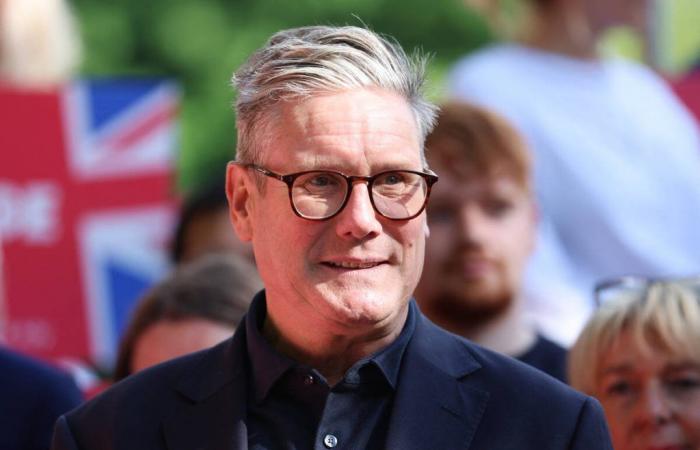Labor leader Keir Starmer visits the Vale Inn on June 27, 2024 in Macclesfield, United Kingdom. CAMERON SMITH / GETTY IMAGES VIA AFP
Facebook Twitter E-mail Copy link
Send
Free access
Narrative After fourteen years in opposition, the Labor Party is expected to win the July 4 general election. The announced victory is due less to the attractiveness of his program than to the erosion of the power of the conservatives.
“I am a candidate to be Prime Minister, not director of a circus. » Grey hair, grey suit, grey tie, Keir Starmer did not indulge in eccentricity when he presented his 136-page electoral manifesto in mid-June in the gigantic Co-op Live venue in Manchester, the former industrial heartland of the north-west of England. The aim, to tell the truth, was not to impress the gallery, but to appear as serious as possible, and above all to avoid any missteps. The Labour Party is widely expected to win the general elections on 4 July, with a twenty-point lead over the Conservatives. It has been leading the polls for over eighteen months. And barring any major surprises, its leader Keir Starmer, a 61-year-old former lawyer, should soon be moving into 10 Downing Street.
Read also
Portrait 10 things to know about Keir Starmer, the “reasonable hope” of a post-Brexit United Kingdom
Subscriber
Read later
Like the French, the British are being called to the polls. And, as on this side of the Channel, it wasn’t really planned. Panic, lack of preparation, anger among elected officials, a rush campaign, the problem of the school holidays starting… The current Prime Minister, the Conservative Rishi Sunak, had until January 2025 to call a vote. He decided to rush the timetable, without anyone really understanding why. The similarities end there. In the United Kingdom, the far right is embodied by Nigel Farage’s pro-Brexit and anti-immigration populist party Reform UK. It risks stealing a few seats from the Tories (Conservative Party) and further aggravating a defeat announced as historic, but it has no chance, according to the polls, of taking first place.
Labour has been champing at the bit in opposition for fourteen years. And in fourteen years, they have had plenty of time to get back on their feet. But they have understood that the success they have announced is less due to a wave of support for their project than to the fed-up feeling of the Conservatives. The Tories’ record is disastrous. They are leaving a country crushed by Brexit (the majority of Britons now consider that leaving Europe was a mistake), weighed down by a decade of zero growth, rising poverty and falling life expectancy among the most disadvantaged.
Read also
Reportage “Broken Britain”: journey to a country in depression
Subscriber
Read later
Above all, their image as an almost two-century-old party, experienced in business administration, has taken a big hit. Brexit referendum conceived as a poker move by Prime Minister David Cameron in 2016, repeated escapades and scandals of Boris Johnson (we remember in particular the illegal parties organized in Downing Street during confinement), express visit by Liz Truss, admirer of Margaret Thatcher, who succeeded in panicking the markets in just 49 short days, lack of political sense and blunders considered out of place by Rishi Sunak, also one of the richest men in the country… ” Britons feel Tories are no longer capable of running the countryanalyzes Samy Chaar, chief economist at Lombard Odier. And it is now Labor which appears to be the party of good managers. »
Clean slate of the Jeremy Corbyn years
When he became Labour leader in April 2020, Keir Starmer immediately refocused. He wiped the slate clean of the years of Jeremy Corbyn, his predecessor, a figure who was a repellent to moderates, considered divisive, radical, clannish, who had failed to resolve cases of anti-Semitism within his troops and who made ambiguous statements about Hamas and Hezbollah. “He’s the British Jean-Luc Mélenchon”an allusion to the French LFI leader, mocks Denis MacShane, former Minister for European Affairs under Tony Blair. The Labour left wing accuses Starmer of having led a purge. Expelled from the party, Jeremy Corbyn has decided to run in his stronghold in north London, the constituency of Islington North, against the candidate invested by Labour.
Starmer’s version of the Labour Party has also gone out of its way to appear as « business friendly » possible. Budgetary rigor has become the mantra of the British left. In the opposition’s shadow cabinet, the post of Chancellor of the Exchequer is occupied by a 44-year-old former Bank of England economist, Rachel Reeves, who devotes her days to meeting leaders business and will likely be the future finance minister if Labor wins the election. “ Keir Starmer has carried out an economic refocusing like Tony Blair’s New Labour in the 1990s, which won three elections in a row. “, notes Florence Faucher, director of the Center for European Studies and Comparative Politics (CEE) at Sciences-Po.
The essential task of the Labor leader during this campaign therefore consisted of remaining as cautious as possible. “He is a politician who is not very charismatic, but structured and organized, who favors general and unifying commitments”analyses Christophe Gillissen, professor at the University of Caen-Normandy. Coming from a modest family from Essex, a region in the east of England – father a worker, mother a nurse –, the only one of four children to have studied law at Leeds and Oxford –, the leader of the Labour Party is called Keir in homage to James Keir Hardie, the first Labour member elected to the House of Commons in 1900, but he is practically a novice in politics. He was elected to the House of Commons for the first time in 2015, at the age of 53, after having pursued a career as a lawyer specialising in human rights and a prosecutor.
In Manchester, in the huge Co-op Live room, Keir Starmer presented his program with the austerity of a notary. Nothing revolutionary, above all. It is not a question of turning the page on liberalism « made in United Kingdom », but to slightly attenuate the stigma for a population bruised by years of austerity policies. The Labor leader wants to invest in the industries of the future, green energies and infrastructure. He also wants to unblock tens of thousands of medical appointments for the NHS (National Health Service), the public health service paralyzed by endless waiting lists, hire 6,500 teachers and restore VAT for private schools. He will also abandon Rishi Sunak’s plan to outsource asylum applications to Rwanda and wants to return to better relations with the European Union. “This is a serious project for the future of our country, he concluded, and each policy (…) has been carefully thought out so that we are sure we can implement it. »






